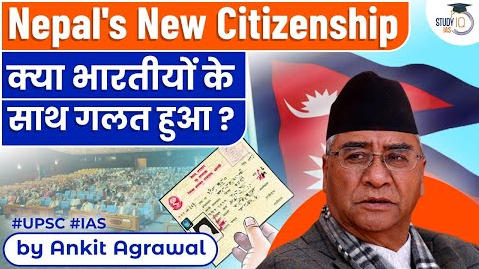Table of Contents

What has happened?
- On August 16, Nepal President Bidhya Devi Bhandari sent back the Citizenship Amendment Act, 2006 to the Pratinidhi Sabha (House of Representatives), the lower house of the Nepal Parliament, urging the members to reconsider the Act.
- The House of Representatives in Nepal on Thursday endorsed the country’s first Citizenship Amendment Bill sent back by President Bidya Devi Bhandari for reconsideration.

- During a voting held in Parliament, a total of 135 voted in favour of endorsing the Amendment Bill in its current form, while 60 lawmakers belonging to the main Opposition party, CPN-UML, voted against the Amendment Bill.
- Only 195 lawmakers were present in the House meeting on Thursday.
- The Bill was endorsed as it is, without making any changes to the one sent earlier to the President for authentication.
- Now, it will again be forwarded to the President for authentication.
- Ahead of the election season, this clash between the President and the Pratinidhi Sabha has ignited a heated debate over the question of citizenship in Nepal.
What is the issue of citizenship in Nepal?
- Nepal transitioned into a democracy beginning with the fall of the monarchy in 2006 and the subsequent election of the Maoist government in 2008.
- The emergence of the multiparty system was followed by the adoption of a constitution on September 20, 2015.
- All Nepalese citizens born before this date got naturalised citizenship.
- But their children remained without citizenship as that was to be guided by a federal law which has not yet been framed.
- This amendment Act is expected to pave the way to citizenship for many such stateless youth as well as their parents.
- The Bill was to amend the Nepal Citizenship Act 2063 BS.
What are the issues with the act?
- The main criticism against the Citizenship Amendment Act, 2006 is that it goes against established parameters of gender justice.
- A cursory reading also reveals contradictions among various sections of the law.
- According to Article 11(2b), a person born to a father or a mother with Nepalese citizenship can get citizenship by descent.
- Article 11(5) of the constitution says a person who is born to a Nepalese mother (who has lived in the country) and an unidentified father will also get citizenship by descent.
- But this section appears humiliating for a mother as she has to declare that her husband is unidentified for the child to be eligible for citizenship.
- In case of a Nepalese father, such declarations are not required.
Has India’s concerned been addressed?
- There is an unarticulated concern in the orthodox sections of the country that as Nepalese men, particularly from the Terai region, continue to marry women from northern India, Nepalese identity would be undermined.
- Because of this “Beti-Roti” (Nepalese men marrying Indian women) issue, many women could not become citizens of Nepal as they were subjected to the infamous seven-year cooling off period before they could apply for citizenship in Nepal.

- As such women were stateless, children of such families were also often found to be without Nepalese citizenship.
- However, the new amendments have done away with the cooling off period for these stateless women.
- This will benefit the children of such families where the mother and children remained stateless for years.
So what’s the problem?
- This has however created a division among the major political parties.
- The Communist Party of Nepal (Unified Marxist–Leninist) wanted to retain the cooling off period,
- While the ruling Nepali Congress and the Maoist party of Pushpa Kamal Dahal Prachanda supported the removal of the cooling off period.
- It is understood that the Prime Minister of Nepal Sher Bahadur Deuba will go to the upcoming polls with the Act as the achievement of his government,
- Despite opposition from President Bhandari who took charge during the Prime Ministerial tenure of K. P. Sharma Oli.
- Despite support from the Madhesi parties (parties formed from the Madhesi movement which advocated greater representation and equal citizenship rights for the people of the Terai region of Nepal) ,
- The inter-ethnic nature of the citizenship dispute has come to the surface because of the controversy triggered by President Bhandari’s rejection.
What next?
- As of Thursday, Nepal Citizenshipless Struggle Committee held a protest in Kathmandu demanding that President Bhandari should ratify the Act that was passed again by the Pratinidhi Sabha for the second time.
- They argue that women of Indian origin, who were deprived of rights because of the cooling off period and bureaucratic procrastination,
- And their children will be stuck in a stateless condition if the Act is not recognised by the President’s office.
Q) From where was the principle of single citizenship in India taken?
- England
- France
- USA
- Canada
Latest Burning Issues | Free PDF






















 WhatsApp
WhatsApp